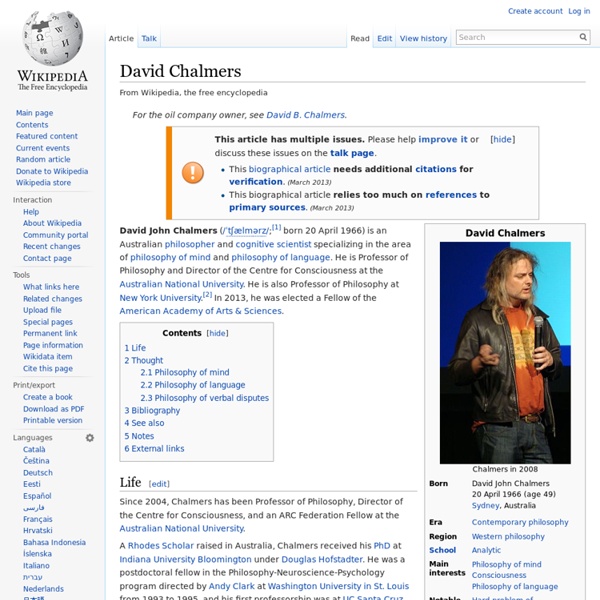John Searle
John Rogers Searle (/sɜrl/; born July 31, 1932) is an American philosopher and currently the Slusser Professor of Philosophy at the University of California, Berkeley. Widely noted for his contributions to the philosophy of language, philosophy of mind and social philosophy, he began teaching at Berkeley in 1959. He received the Jean Nicod Prize in 2000; the National Humanities Medal in 2004; and the Mind & Brain Prize in 2006. Among his notable concepts is the "Chinese room" argument against "strong" artificial intelligence.
Saul Kripke
Saul Aaron Kripke (/sɔːl ˈkrɪpki/; born November 13, 1940) is an American philosopher and logician. He is currently McCosh Professor of Philosophy, Emeritus, at Princeton University and teaches as a Distinguished Professor of Philosophy at the CUNY Graduate Center. Since the 1960s Kripke has been a central figure in a number of fields related to mathematical logic, philosophy of language, philosophy of mathematics, metaphysics, epistemology, and set theory. Much of his work remains unpublished or exists only as tape-recordings and privately circulated manuscripts. Kripke was the recipient of the 2001 Schock Prize in Logic and Philosophy. A recent academic poll ranked Kripke among the top ten most important philosophers of the past 200 years.[1]
Graham Priest
Graham Priest[1] (born 1948) is Distinguished Professor of Philosophy at the CUNY Graduate Center, as well as a regular visitor at the University of Melbourne where he was Boyce Gibson Professor of Philosophy and also at St. Andrews University. He was educated at the University of Cambridge and the London School of Economics.
Leon Wieseltier
Leon Wieseltier (/ˈwiːzəltɪər/; born June 14, 1952) is an American writer, critic, amateur philosopher and magazine editor. From 1983 to 2014, he was the literary editor of The New Republic. He is currently the Isaiah Berlin Senior Fellow in Culture and Policy at the Brookings Institution and a contributing editor and critic at The Atlantic. Life and career[edit] A child of Holocaust survivors,[1] Wieseltier was born in Brooklyn, New York, and attended the Yeshiva of Flatbush, Columbia University, Oxford University, and Harvard University.
Rhetoric - Wikipedia, the free encyclopedia
Painting depicting a lecture in a knight academy, painted by Pieter Isaacsz or Reinhold Timm for Rosenborg Castle as part of a series of seven paintings depicting the seven independent arts. This painting illustrates rhetorics. From Ancient Greece to the late 19th century, it was a central part of Western education, filling the need to train public speakers and writers to move audiences to action with arguments.[4] The word is derived from the Greek ῥητορικός (rhētorikós), "oratorical",[5] from ῥήτωρ (rhḗtōr), "public speaker",[6] related to ῥῆμα (rhêma), "that which is said or spoken, word, saying",[7] and ultimately derived from the verb ἐρῶ (erō), "say, speak".[8] Uses of rhetoric[edit] Scope of rhetoric[edit]
Tutorial: Concrete vs. Abstract Thinking
WHAT ARE CONCRETE AND ABSTRACT THINKING? Abstract thinking is a level of thinking about things that is removed from the facts of the “here and now”, and from specific examples of the things or concepts being thought about. Abstract thinkers are able to reflect on events and ideas, and on attributes and relationships separate from the objects that have those attributes or share those relationships. Thus, for example, a concrete thinker can think about this particular dog; a more abstract thinker can think about dogs in general. A concrete thinker can think about this dog on this rug; a more abstract thinker can think about spatial relations, like “on”. A concrete thinker can see that this ball is big; a more abstract thinker can think about size in general.
Triple Nine Society
The Triple Nine Society (TNS), founded in 1978, is a 501(c)(7) non-profit voluntary association of adults who have scored at or above the 99.9th percentile on specific IQ tests (or similar) under supervised conditions, which generally corresponds to an IQ of 149 or greater using a standard deviation of 16 (e.g. Stanford-Binet IV) and 146 or greater with a standard deviation of 15 (e.g. WAIS-IV, Stanford-Binet 5).[1] This compares with Mensa International, the better-known and larger membership high IQ society which admits applicants who score at or above the 98th percentile, which generally corresponds with an IQ score of 131 (SD 15) or 133 (SD 16), or greater. As of mid-March 2015, TNS reported over 1,500 members residing in more than 40 countries, with most members residing in the United States and Europe.[2] TNS publishes a journal entitled Vidya which contains articles, poetry and other creative content contributed by members conversant with a variety of subjects. References[edit]
Rosenhan experiment
Experiment to determine the validity of psychiatric diagnosis Rosenhan's study was done in eight parts. The first part involved the use of healthy associates or "pseudopatients" (three women and five men, including Rosenhan himself) who briefly feigned auditory hallucinations in an attempt to gain admission to 12 psychiatric hospitals in five states in the United States. All were admitted and diagnosed with psychiatric disorders. After admission, the pseudopatients acted normally and told staff that they felt fine and had no longer experienced any additional hallucinations.



